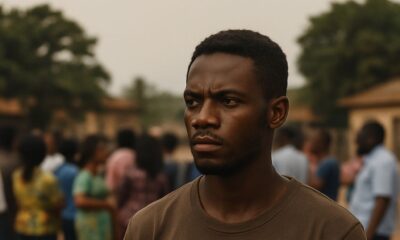Features
Ifeoluwapo Odedere: If Facebook Started in Nigeria
 Imagine Mark Zuckerberg was a Nigerian, living in Nigeria. He’d have attended Obafemi Awolowo University (OAU) where he’d have had the idea for Facebook (or Slumbook or whatever). Excited, he will develop a website and test it with a few of his roommates (and squatters). This is great! They will tell him. Emboldened by these comments, he will go on to expand the capabilities of the website to involve all the students of OAU. The popularity of the site will be so much that OAU’s archaic servers will shut down.
Imagine Mark Zuckerberg was a Nigerian, living in Nigeria. He’d have attended Obafemi Awolowo University (OAU) where he’d have had the idea for Facebook (or Slumbook or whatever). Excited, he will develop a website and test it with a few of his roommates (and squatters). This is great! They will tell him. Emboldened by these comments, he will go on to expand the capabilities of the website to involve all the students of OAU. The popularity of the site will be so much that OAU’s archaic servers will shut down.
Enraged, the VC of OAU will call Mark and sharply reprimand him for ‘wasting precious time’ when he should have been studying. Then he will go on to recount how Great Ife (OAU) always produced First-Class students who could compete academically with their peers from all over the world (emphasis on academically). Mark will then be given a two-week suspension to cool his blood and serve as a lesson to other non-conforming students.
On his return from suspension, Mark will face a series of semester exams, a consequence of the just concluded NUT strike which has forced lecturers to rush their schedules. After his exams, the NUT embarks on another strike – this time, for six months. The strike will provide Mark with the time he needs to refine the website he has created. By this time, students from UNILAG and Covenant University would have started using the website which has been named The Facebook.
Seeing a future in The Facebook, Mark would decide that it’s not worth it going back to school. He has just read about Jason Njoku – the iRoko boy and Sim Shagaya – the e-commerce sage, and he is convinced that he can achieve something similar, if not better. So he decides to quit school and invest his time and energy in building The Facebook, which he believes ‘will be a service to the world’. And this is where his problems will begin.
You see, Mark will have a hard time convincing his parents about his ambition. They won’t understand why anyone in his right mind would drop out of OAU when thousands of students were struggling to gain admission there. His enraged father will stop supporting him financially and Mark would have to leave home and stay with a much older friend. Away from the shelter of the university walls, Mark would experience the wrath of PHCN in full – constant power outage will interrupt his software development process so that he is only able to write a few lines of code every day. But Mark, a believer in his vision, will be more than willing to pay the price of petrol to fuel the china-made generator that powers his friend’s house – at the cost of at least N800 daily. This will be in addition to the N25,000 monthly to renew his 50GB subscription.
After 3 months of contending with erratic electricity supply and ridiculous internet fees (and speeds), Mark will finally complete his project, now renamed Facebook. The site has over 100,000 active users daily and doesn’t look like it’s going out of fashion soon. At this rate, it’s probably going to be the next Linda Ikeji or NairaLand. You’d think that should be a cause for rejoicing but Mark is broke. Stone-cold broke. He needs to do something fast. He will visit a certain hub for techies only to find out that it is overflowing with inventors looking for investors. Next, he will take his proposal to MTN, GTBank and Dangote to name a few – in hopes of attracting the much needed direct investment but no funding will come.
‘This website has the potential to be the next My Space or NairaLand’, Mark will tell the executives. But they won’t get it. Here’s why – it will take at least 3 years for the investors to see a sizeable return on their investments. That’s if they are lucky. Nobody waits that long in Nigeria. Other investors will be concerned that he’s a drop-out. He does not have a fancy degree – the likes of an MBA or a PhD or a GCFR.
A wonderful piece of invention that could literarily change the world and make its investors rich has just been brushed aside like it was a piece of groundnut wrapper. Elsewhere in the world, the US for example, investors would have latched on to this idea and would have been bidding in their millions. Here in Nigeria, Mark will be struggling to convince rich but blind people about the potential of Facebook.
At the end of it all, there will be only one option left for Mark Zuckerberg. He will have to swallow his pride and go back home to meet his father. And with that Facebook will die. Actually it will never have lived.
This is a true story. It is the story of most startups in Nigeria. Every day startups die and vibrant ideas perish in infancy… all because they do not receive the much needed funding that would have made a whole world of difference. Special thanks to the local investor who sees only short-term gain where there should be long-lasting institutions.
Photo Credit: Dreamstime | Kiosea39






















